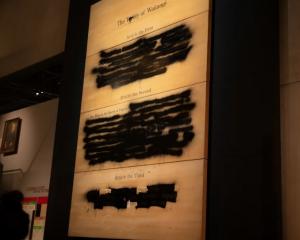
Greens co-leader Russel Norman asked police to investigate following revelations that the Government Communications Security Bureau (GCSB) had unlawfully intercepted private communications, including those of internet mogul Kim Dotcom.
He asked police to investigate whether any GCSB officers had committed a criminal offence, and specifically whether they had breached section 216B of the Crimes Act 1961.
Seven months later, Dr Norman wrote to the Police Commissioner asking that his complaint be widened to cover all cases in the past decade where the GCSB might have 'unlawfully spied' on people.
In the authority's report released today, chairman Sir David Carruthers said its investigation looked into the police's reliance on an absence of criminal intent to reach a decision; the appointment of Kristy McDonald QC by police to oversee their investigation and a police failure to investigate an additional 56, potentially unlawful, interceptions by the GCSB that had been identified in the report to the Prime Minister by the former Secretary to the Cabinet Rebecca Kitteridge.
The authority found police were justified in relying upon an absence of criminal intent to reach their decision not to prosecute, Sir David said.
"The police decision not to prosecute was based squarely on an opinion provided by the Solicitor-General.
"Police were quite entitled to rely upon this advice, and indeed, having received the opinion it would have been surprising if they had proceeded on any other basis."
The authority also found the engagement of Ms McDonald did not create any conflict of interest and was justified.
The authority also found the additional 56 potentially unlawful interceptions by the GCSB identified in the Kitteridge Report all related to metadata rather than the content of communications.
Since the law was unclear as to whether interceptions of metadata were unlawful, the decision by police not to investigate the additional interceptions was also justified, Sir David said.
Police: The matter is now closed
In their response today, police said the IPCA report dismissed all three aspects of the complaint made by Dr Norman.
"The IPCA report finds no evidence of any misconduct or neglect of duty by police regarding its investigation," Assistant Commissioner Malcolm Burgess said in a statement.
"The report confirms that police were entitled to rely on legal advice provided by the Solicitor-General in reaching a decision that there had been no criminal intent on the part of GCSB staff in intercepting the communications and that there was no conflict of interest in Police appointing Kristy McDonald QC to oversee the matter.
"It also finds that because the law was unclear relating to the interception of metadata, Police were justified in not investigating the additional interceptions."
Mr Burgess said police now considered the matter closed.
Greens: IPCA didn't look at crux of complaint
The Green Party said New Zealanders who were illegally spied on would probably never get their justice.
"The IPCA did not look at the issue which formed the crux of the complaint, which is, did the police rely on the wrong interpretation of the law when deciding not to prosecute," said Greens co-leader Russel Norman.
"The IPCA, in part of their report, concluded the matter was not for the police but for the courts. How can someone go to court on the issue when a person doesn't even know if they have been spied on or not? The whole process is a Catch-22," he said.
"The report gives a green light for illegal spying because the system has set itself up to be impenetrable to inquiries for justice.
The Greens reiterates their call for an open and independent inquiry and an overhaul of the country's intelligence agencies.












